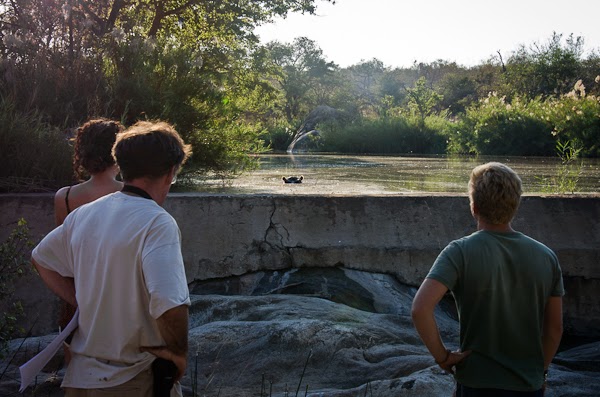Ben Coley, Head Instructor for EcoTraining gave us a bit of insight on the Riverine Ecology Course that took place at Karongwe Game Reserve
Last week, Eco-Training’s Karongwe students
were fortunate enough to entertain the services of Llew Llew Taylor from Taylor
Environmental. Llew has spent decades
working from various governments environment departments before branching out
on his own. His specialty is something
that we know is vital for all life on Earth, but something that we all take for
granted: water.
For a day and half, Llew imparted his
knowledge, explaining the various properties of water and WHY it, and the
ecosystem associated around it is so important.
After a brief lecture, we headed out into the field to examine the
quality of the water in the Karongwe River.
One of the best ways to measure the quality of a river is to examine
which species of ‘macro-invertebrates’ are found within in. In order to do this, teams were given the
task of taking samples of the water from various different areas, and then identifying
its inhabitants. All organisms have an
ecological niche within which they can survive.
Factors such a PH levels and the amount of sediment will dictate which
animals can exist within it. Therefore,
each species is assigned a number between 1-15 depending on its rarity. The rarer the species, the better the water
quality. The students also did a vegetation survey whereby species of plant life within the riverine boundaries were examined and assigned values based upon their densities. Most importantly, alien or invasive, species were also identified. These 2 pools of results were entered into a standardized spreadsheet and the end result showed that the Karongwe River was good quality!
Practical exercises are all enjoyable and
the whole process helped to give the students a better understanding of why it
is important to respect and understand the riverine ecosystem. `The position chosen was close to a weir and
its high vantage point allowed a resident hippo cow and her young offspring the
perfect view of our activities. At no
point did she show any aggression towards us and her demeanour was more one of
curiosity as the students busied themselves with nets and petrie dishes! We
also took the opportunity to examine some the other riverine inhabitants such
as the beautiful scarlet dropwing.
Llew’s experience and knowledge was hugely
beneficial in aiding a better understanding of nature’s most valuable elixir
and the students were awarded a certificate of achievement at the end of the
course. 









No comments:
Post a Comment